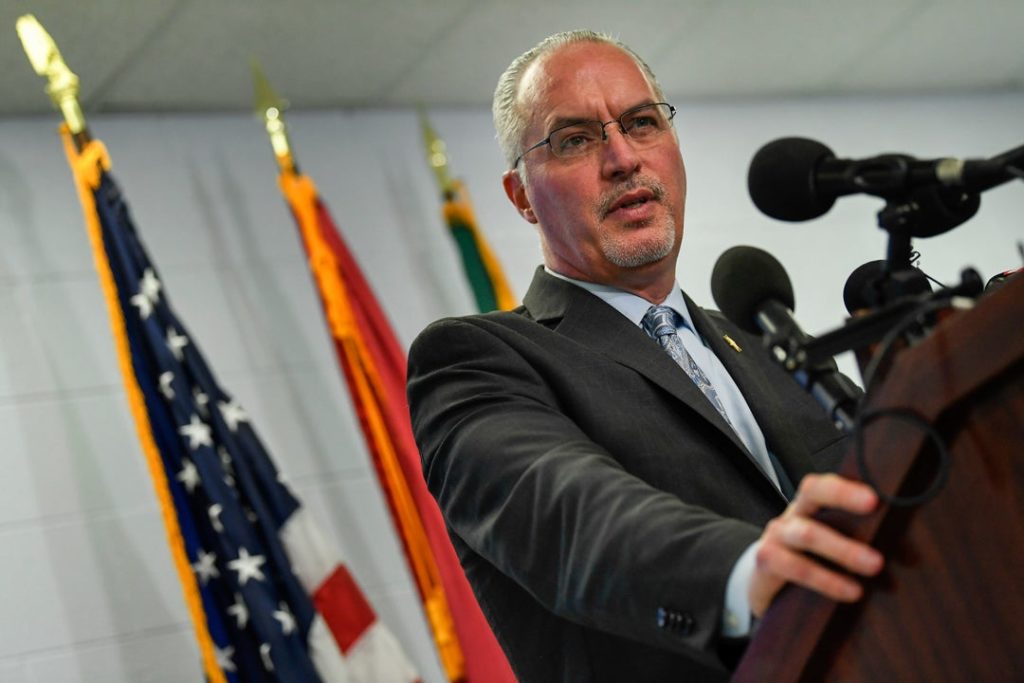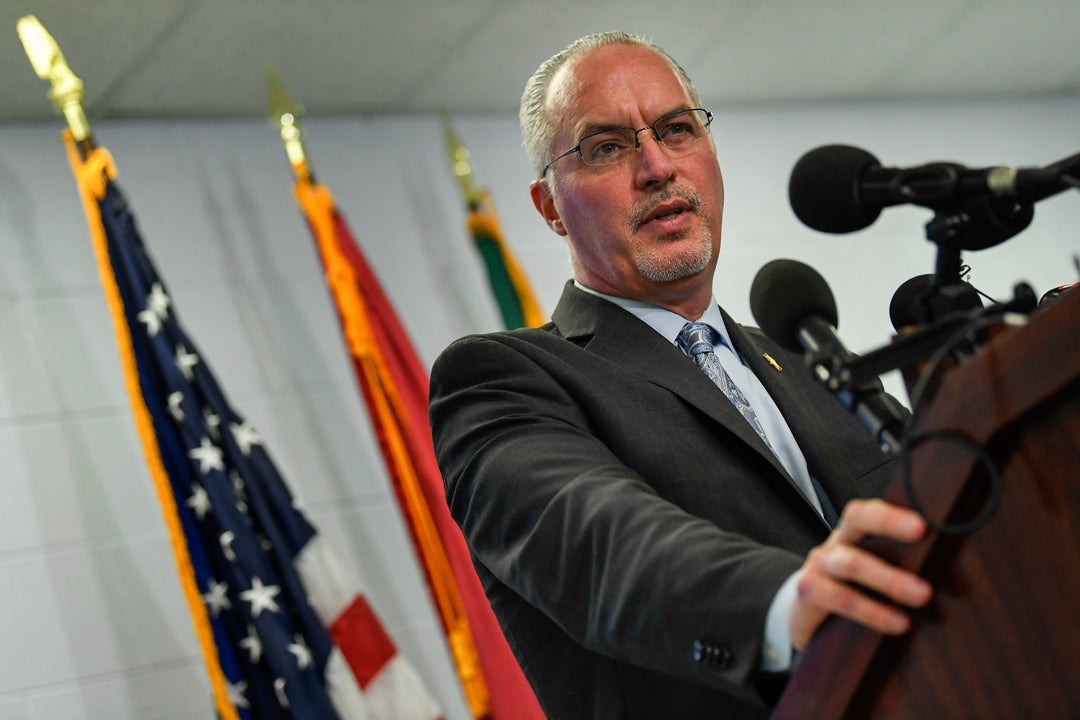Nashville sheriff grapples with warp-speed takeover of CoreCivic-run facility – The Tennessean


Nashville Sheriff Daron Hall says boiling tensions between activists and the private prison company CoreCivic have put his office in an incredible bind, saddling employees with a mountain of unexpected work in the middle of an all-consuming pandemic.
Hall said CoreCivic’s abrupt decision this summer to pull out of its relationship with the city — following escalating pressure from activists and some city leaders — forced the sheriff’s office to fast-track hypothetical plans to take over operations of the Metro-Davidson County Detention Facility in South Nashville.
Normally, Hall said, a transition that massive would take up to a year to plan and complete. A plan from city leaders called for a two-year lead-up. Now the process is being rushed through in three months.
Less than a month away from the Oct. 4 departure of CoreCivic, lingering questions remain unanswered.
Sheriff’s office employees generally make more money and have more expensive benefits than CoreCivic employees. Staffing and equipment needs are still being analyzed.
While state officials indicated they would be willing to reimburse the sheriff’s office for much of that cost, Hall said, an agreement has not been finalized during the truncated transition phase. It remains unclear what the city might have to pay.
“It just hasn’t been handled the right way, quite frankly,” the sheriff said of the quick transition. “Because of the activism and because of the sour grapes, the bruised feelings, on the CoreCivic side of things, the work falls on the sheriff’s office. …
“They called each other’s bluff and left us with the bag.”
Rift followed council criticism of CoreCivic
CoreCivic operated the 1,300-bed detention center, which houses state inmates serving shorter sentences, since it opened in 1992. The cost of the company’s contract with the city is covered by the Tennessee Department of Correction.
RELATED: CoreCivic accuses Nashville of ‘playing politics,’ will walk away from prison contract with city
MOUNTING SCRUTINY: CoreCivic once again at crossroads as stock losses, image problems loom
City leaders have mulled the possibility of parting with CoreCivic for years. Scrutiny mounted over time amid growing criticism of the conditions of privately run prisons in Nashville and nationwide.
Council member Freddie O’Connell passed a bill in 2017 that set up more oversight for CoreCivic and began working with Hall to determine if a city takeover was feasible.
In July, O’Connell and Council member Emily Benedict renewed efforts to end the contract to run the detention facility — but not until 2022.
CoreCivic CEO Damon T. Hininger took umbrage, saying in a letter to the city that his company “cannot agree to be strung along while Metro takes calculated steps to end our partnership.”
In the July memo, Hininger said his company would hand over the keys of the detention facility on Oct. 4, two years ahead of the schedule laid out in the legislation.
The surprise Oct. 4 deadline forced Hall to navigate the logistics without a fully developed strategic plan.
O’Connell said Hall was “having to build the airplane in real time” by quickly addressing staffing, equipment and other urgent needs. He praised the sheriff’s work, but acknowledged the tension created by the new timeline.
“My preference from the get go was to focus on a responsible transition,” O’Connell said. “The faster you move with something you know already to be complex the greater your risks are.”
Sheriff tackles dual crises during COVID-19 pandemic
CoreCivic’s announcement also required the sheriff’s office to shift focus in the midst of the COVID-19 crisis that is roiling the city jails he oversees.
The sheriff’s office said 331 inmates tested positive for the virus and then recovered as of Wednesday. Two inmates have the virus now, and one has died. As outbreaks ripple across the jail system, dozens more inmates have been restricted to small areas of the jails to limit the spread.
“Just imagine that and then someone throwing this crisis right in the middle of that,” Hall said. The corresponding crunch made Davidson County “maybe the only sheriff’s office in the country where COVID is the second crisis we’re dealing with every day.”
Hall, who collaborated with O’Connell to map out the logistics of a possible long-term transition, said earlier this summer the city’s takeover of the detention center would have a “minimal” fiscal impact to the city. But, in an interview this month, Hall said planning “really got pushed to the side” by the abrupt escalation this summer.
“Can we do it? Yes we can do it. What we really need is the money and the time,” Hall said. “Neither one of those really were able to be done, so now what we’re doing is playing catch up.”
The unanswered question: How much will it cost?
On Wednesday, Hall said it would take about $2 million to start up city-run operations at the facility.
Payments from the Department of Correction, in exchange for housing state inmates, covered the cost of CoreCivic’s day-to-day operations. But sheriff’s office employees get paid more and have better benefits, which will drive up the cost to operate once Hall takes over.
Hall said 126 of the detention facility’s 181 staff were expected to transfer into the sheriff’s office as of Friday. He did not know what final staffing levels would be.
Hall said there will be negotiations with the state to determine a rate for reimbursement for his office’s daily work. Initial conversations with the state indicated the agency would be willing to adjust its pay to reflect the sheriff’s costs.
But Hall said he can’t say for sure how those talks will play out, or exactly how much the city might have to pay.
“Those are questions as we go,” he said.
Nashville’s much ballyhooed budget crunch underscores the consequences of those questions and their answers. The city passed a historic property tax increase this year to replenish its threadbare savings, and the pandemic threatens to diminish critical sales tax revenue.
As things stand now, O’Connell said, the city was charging into the unknown and hoping for the best.
“What we are doing right now is crossing our fingers,” O’Connell said.
Yihyun Jeong contributed to this report.
Reach Adam Tamburin at 615-726-5986 and atamburin@tennessean.com. Follow him on Twitter @tamburintweets.
Published 12:29 PM EDT Sep 11, 2020
